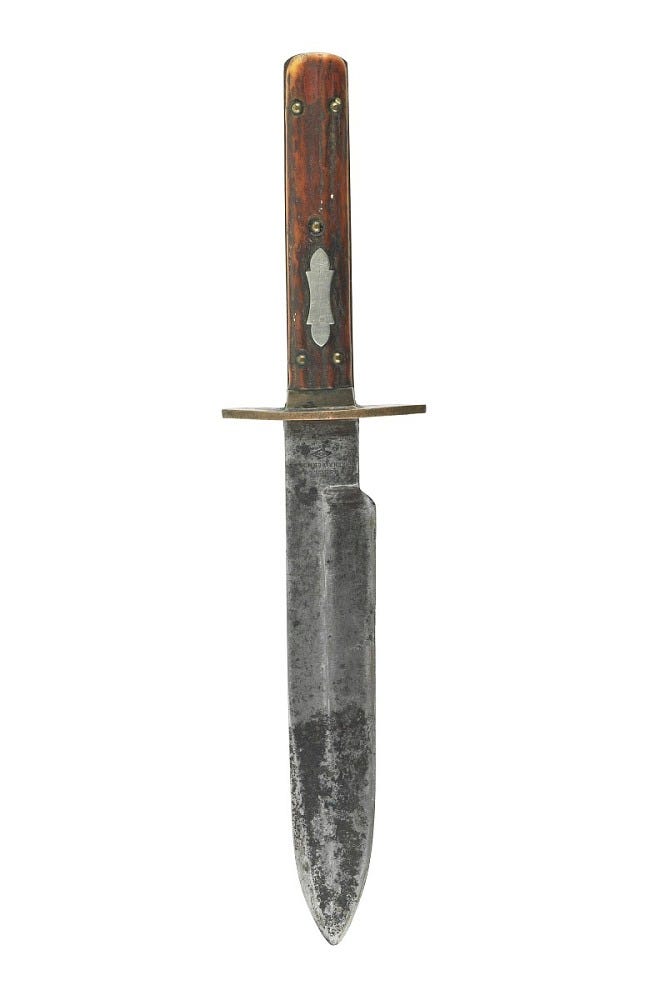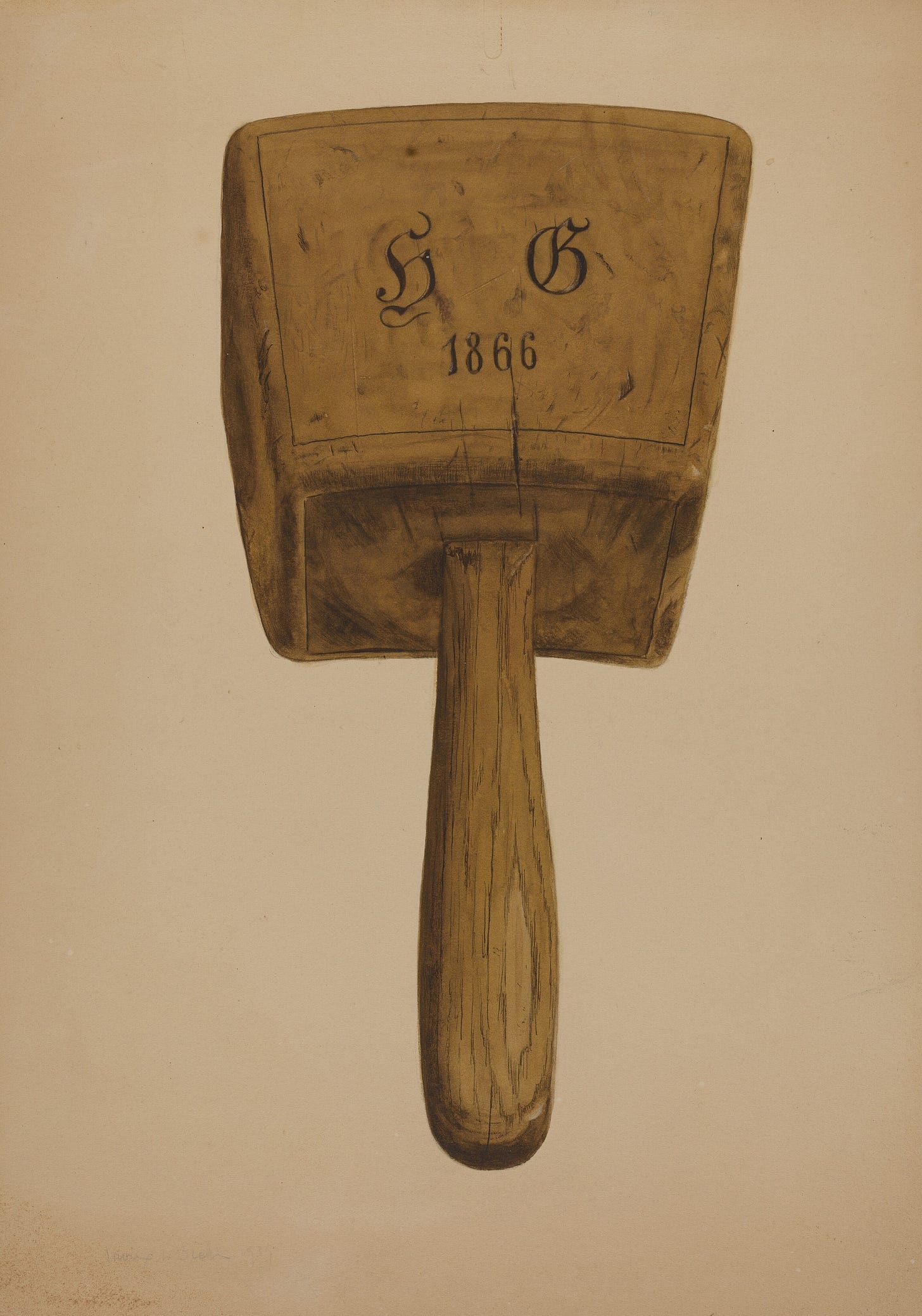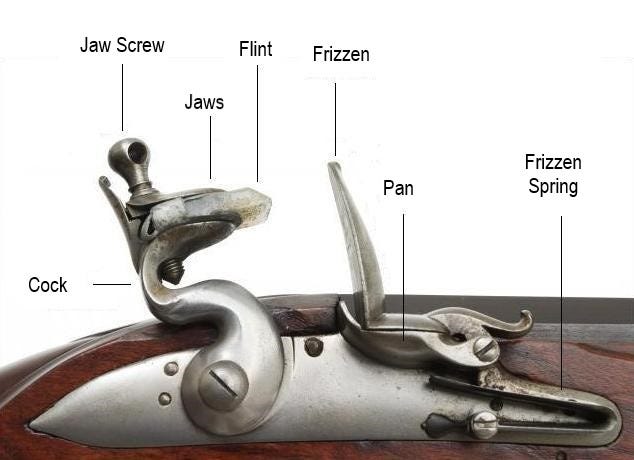[16] “sacristy”—a room containing liturgical garments and sacred implements where a priest prepares for mass.
[16] “swale”—a low place in terrain, sometimes containing a marsh or swamp (rather unlikely here).
[16] “sprent”—an archaic word meaning “sprinkled.”
[16] “the king’s road”—a literal translation of El Camino Real (also called “The Royal Road” or “King’s Highway”), a trail blazed by the Spanish in the 17th & 18th centuries, running from Nacogdoches in east Texas to Laredo in southwest Texas.
[16] “raggedyman”—a scarecrow.
[17] “anchorite”—in the medieval Christian tradition, an anchorite is a religious recluse who retreats from society ti devote himself to meditation and prayer, general confining himself to a room.
[18] “possibles”—this term was a holdover from the so-called mountain men of frontier days. A man’s “possibles bag” was a rawhide or buckskin pouch with a shoulder strap, containing any items he might possibly need: black powder, lead balls, cloth patches, wadding, ball-starter, coins, etc.
[19] “slaver”—this man was a slave-trader, perhaps a "slave-catcher.” Even among slave-owning planters in Southern states, slavers were reviled as low-class con men and thugs—in much the same way as drug dealers are viewed by many today, including those who purchase drugs.
[20] “machine to make the machine”—the invention of the cotton gin (patented in 1794 by Eli Whitney) turned cotton from a unpopular fiber that was too laborious to clean/process to the most popular material in the world and the fuel that ran the Industrial Revolution—a fuel that was picked by the hands of enslaved people. Slave-picked cotton fed the textile factories in the northern United States and Great Britain and the explosion of short-staple cotton across the southern United States meant the explosion and expansion of slavery.
The irony of the anchorite’s lecture about the dangers of “the machine” is that this hermit was once a cog in the engine of mass human torture/murder that was American Slavery.
[21] “the hermit bent over him and all but in his bed”—the novel’s second reference to pedophilia, a theme that runs throughout the book and one that will have catastrophic consequences for our protagonist in the final chapter.
[21] “pilotbread”—hardtack, a dense biscuit like a saltine cracker, popular in the navies of Western countries in the 19th century, and later a staple of soldiers in the American Civil War.
[21] “drove of cattle…life on the trail…Abilene”—McCarthy is meticulous in his research, but he gets something wrong here. First, there was no Abilene, Kansas (founded in 1857) or Abilene, Texas(founded in in 1881.
[22] “Bexar”—San Antonio de Bexar (present-day San Antonio, Texas).
[22] “greenriver knife”—from Smithsonian: “John Russell began manufacturing tools and cutlery in 1834 and established a new factory on the Green River in Massachusetts in 1836. His knives rivaled the quality of those manufactured in Sheffield, England, and as settlers moved West in the 1840s Russell's Green River knives moved with them. Green River knives were ubiquitous in the early American West, and the phrase "up to Green River" entered the American lexicon meaning something well constructed or very well done.”
[23] “osnaburg covers”—from Wikipedia: “Osnaburg is a general term for coarse, plain-weave fabric. It also refers specifically to a historic fabric originally woven in flax but also in tow or jute, and from flax or tow warp with a mixed or jute weft.”
[23] “tall stone powderhouse”—this (gun)powder house on present-day Powder House Hill in San Antonio (about a mile and a half from the Alamo) was first built by Spanish settlers. Readers of Blood Meridian will recognize the (explosive) ingredients brought together here: wood charcoal from the Hill Country; saltpeter processed from bat guano which was gathered in the Longhorn Caverns; sulphur from Mexico.
[24] “dígame”—“How may I help you?
[24] “abuelito”—“grandpa”
[24] “Qué dice el muchacho” —“What does the boy say?”
[25] “Quiere hecharse una copa. Pero no puede pagar.”—“He wants a drink. But he cannot pay.”
[25] “Quiere trabajo. Quien sabe.”—“He wants a job. Who can say.”
[25] “No esta sucio.”—“It [the floor] isn’t dirty.”
[26] “Andale.”—“Get going.”
[26] “Está borracho.”—“He is drunk.”
[26] “bungstarter”—a wooden mallet used to loosen the bung of a cask.
[27] “frizzen”—from Wikipedia: “The frizzen, historically called the ‘hammer’ or the ‘steel’ is an L-shaped piece of steel hinged at the front used in flintlock firearms. The frizzen is held in one of two positions, opened or closed When closed, it is positioned over the pan so as to enclose a small priming charge of black powder next to the flash hole that is drilled through the barrel into which the main charge has been loaded.”
[27] “roadagent’s pass”—the Kid shifts the unbroken bottle to his dominant hand
[28] “a headless child”—the Christ child of this novel has been decapitated, and with Him, salvation and grace.









Excellent entry. Chapter 2 is usually the chapter of the novel that kinda fades into the background for me in comparison to the rest (in my screenplay adaptation, I cut it out entirely and had the burning of the hotel lead to the kid's recruitment into Captain White's freebooters), but it does have that fantastic soliloquy about when God made man the devil was at his elbow. Plus how can anyone not love that opening: "Now come days of begging, days of theft."
Ok I’ve read ATPH and NCFOM and I’m a believer. Before I start BM would it be good to read Moby Dick first since I’ve never read that?